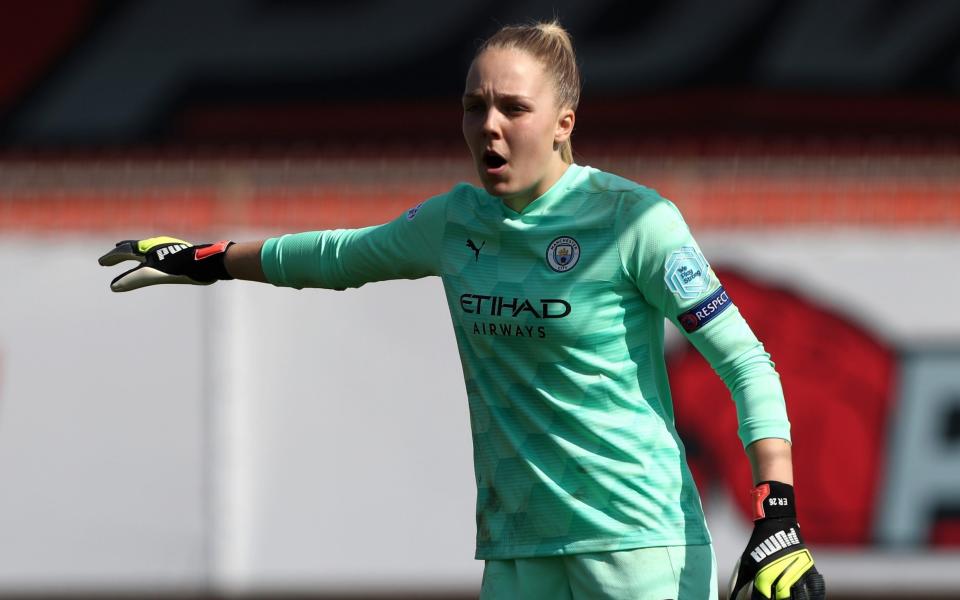Ann-Katrin Berger at forefront of goalkeeping revolution as teams learn to look after No 1s

With just a few minutes left on the clock at the Academy Stadium last month, Ann-Katrin Berger produced what we now know was a title-winning save for Chelsea.
The score at 2-2 against rivals Manchester City, Berger steadied herself in her six-yard box as City's Alex Greenwood whipped in a corner to the near post, where Lauren Hemp's header hurtled towards the far top corner of goal. Berger had a split second to stretch out her hand and flick the ball over the bar, stopping City's celebrations in their tracks. It was a moment of pure drama that quite literally tipped the title race her team's way.
But when recounting it, Berger veers away from cliches about time standing still. She was able to save the shot for a very simple reason: it's what Chelsea train her for.
"We do a lot of reaction work, so I think it pays off in these kind of moments," she says.
That may seem a dull response to what England legend Fara Williams called the best save she had ever seen in the Women's Super League. But to Berger, and many top goalkeepers in the women's game, specific goalkeeper training is a completely novel and recent development.
Berger, 30, goes through a list of her clubs over a 12-year career, before she moved to Chelsea in 2019, recounting the varying levels of support. At Sindelfingen, in Germany's second division, it was twice a week with a goalkeeper coach. In Potsdam in the top division she rarely had one-on-one time with a goalkeeper coach: "They were a club that won the Champions League [in 2005], but there wasn't anyone looking into the goalkeepers needing their own session," she says.
At Paris Saint-Germain it was "better": 20 minutes daily. Then at Birmingham City — where she overcame thyroid cancer — she went back to two sessions a week. Chelsea, a team with one of the biggest budgets in Europe, is a different beast, she explains: "I can see my improvement because I get the small details every day instead of every second day. Outfielders train every day so why did we not have that before as a goalkeeper? It’s a good step forward, for women’s football especially."
Others can relate. Crystal Palace goalkeeper Chloe Morgan, 31, says her specific training throughout her career has been intermittent at best, and it is why she has set up grassroots goalkeeping coaching, M-Power, for girls and non-binary players. She knows how valuable it was to her: "It was about two years into being at Spurs in 2017 that we got a specific goalkeeper coach in training. That was when my progress really took off."
These experiences are why debates about supposedly poor quality goalkeeping in the women's game and the need for smaller goals can lack context. "When you look back at the history of women's football, with the 50-year FA ban, we're still playing catch up," Morgan says.
Rachel Brown-Finnis, former England and Everton goalkeeper, says players coming through club academies now have expertise on communication, distribution and technique imparted to them in their formative years — not in the twilight of their careers as in her case, retiring in 2014.
It may be why WSL clubs' first choice goalkeepers are on average younger than those in the Premier League, and half of them are under 25, as the younger generation have had good practice ingrained early on. "All of the [younger] English girls who are playing in the league have come through Centres of Excellence and are standing up to be counted this season," Brown-Finnis says. "Ellie Roebuck [21, Manchester City], Hannah Hampton [20, Birmingham] and Sandy MacIver [22, Everton] have kept their teams in games. They're absolutely the end product of the investment that the FA and clubs have put in."

Morgan agrees: "At some of the top clubs they start their goalkeeper coaching from 12 years old, so by the time they actually step out at senior level, they've already got maybe 10 years worth under their belt. They're on par with the kind of experiences that I would have had, but at a lot younger age."
Berger has had a different trajectory to most. Until she was 16 she was a striker, and even juggled both positions for a time in Germany's fourth division. "Halftime goalkeeper and halftime striker," she says, laughing about her former double life. She has come a long way since, technically and vocally, now readily barking orders to her team-mates, in complete contrast to her softly-spoken off-pitch persona.
Winning the WSL golden glove is a testament to her progress, though she has bizarrely been overlooked for the Germany national team, earning her first of just two caps last year. On Sunday night she reaches the pinnacle in her and Chelsea's first Champions League final, after an incredible run of form: saving two penalties against Atletico Madrid in the last 16, and keeping Chelsea in contention against Wolfsburg in the quarter-finals. But it was her performance in the league against City — and that save — which saw her go viral.
"In the moment you just don't realise how important or how good it was — you just see the ball not in your net," she says. "But it’s nice to get that recognition."
To see widespread positive responses to women's goalkeeping felt like somewhat of a moment. "It shows that people maybe are recognising that goalkeepers can be massive game-changers as much as centre forwards are," Brown-Finnis says.
It prompted Emma Hayes to call Berger the best in the world, not that the modest goalkeeper takes the compliment. "I would never call myself that," she says with a furious shake of her head.
Days after the City save she was brought back down to earth, her mistake against Bayern Munich in the Champions League semi-finals costing Chelsea a goal in the first leg. It is the nature of goalkeeping, and she put it down to mental fatigue after Chelsea's hectic end-of-season schedule. She feels refreshed for Sunday night though, and will have to be against a Barcelona team that have scored 166 goals this season.
She can take confidence from a simple but invaluable fact. "It's what we're training for," she says with a smile, "every day."

 Yahoo Finance
Yahoo Finance 